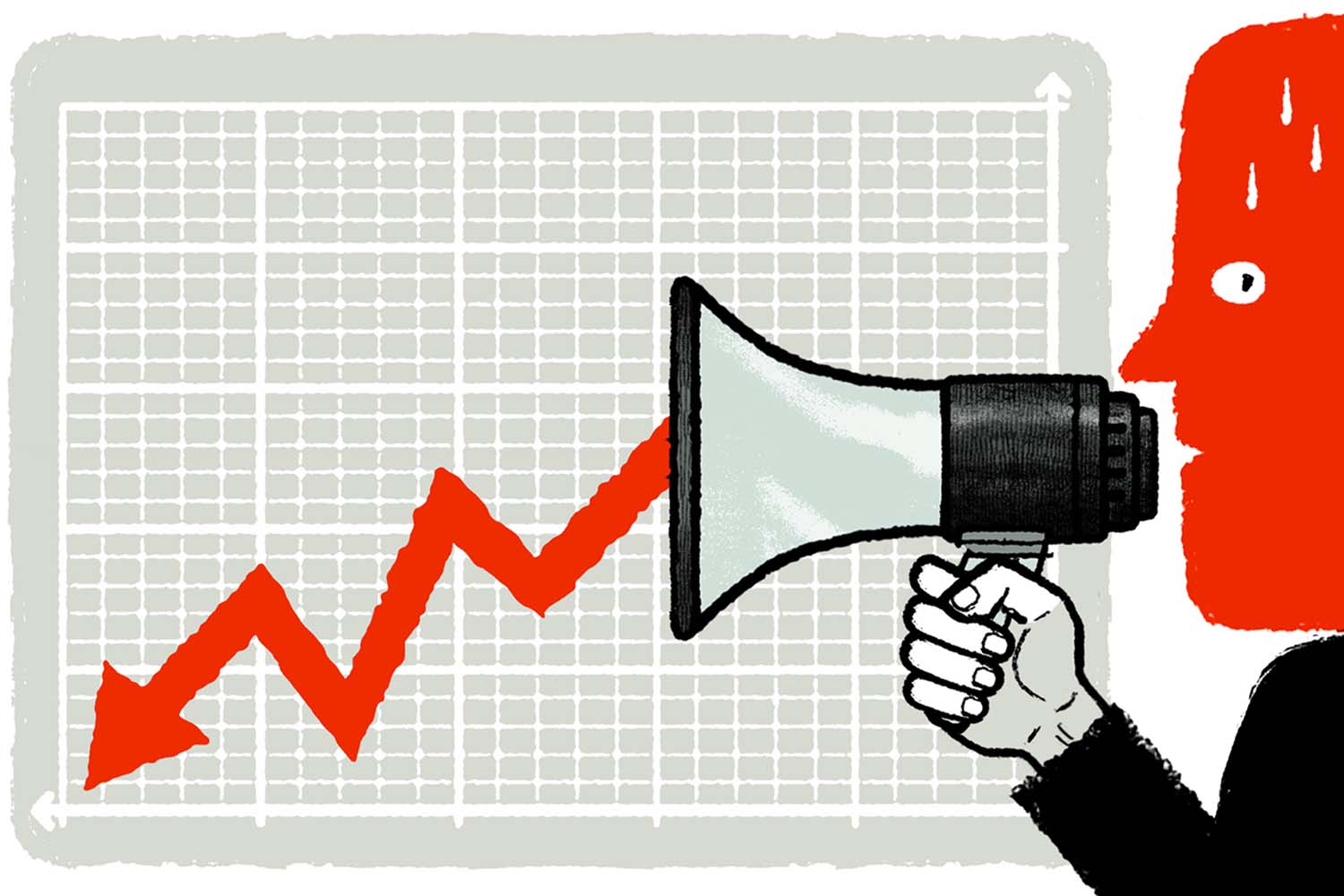I have a new verbal tic. It’s ruining my life and annoying everyone I know. You may have the same one. I can’t stop calling everything a “recession indicator”.
Once the preserve of economic forecasters and people with credit scores higher than my own, “recession indicators” is suddenly a meme-like catchphrase, available to us all and to be applied to whatever we feel like. Leonardo DiCaprio dating a beautiful 26-year-old woman, in direct contradiction of his previous “no over-25s” rule? That’s a recession indicator, my friend. Kesha removing the dollar sign from her name? That’s one, too.
Sometimes it’s a label applied to the personal, rather than the cultural. Your friend getting married? Recession indicator. Sudden proliferation of baby showers among your social circle? Ditto. Other times, it’s a label applied more sensibly, grounded in miserable financial realities. Skyrocketing price of eggs in the US? Recession indicator. The rise of sales in frozen pizza? The fact that fewer people are donating to charity than ever before? Recession indicators. The ability to use Klarna to pay for food on delivery apps? You better believe it.
What often unites these disparate and seemingly random recession indicators is their status as cultural throwbacks, artefacts from the bygone era of the last recession we staggered through. Recently, therefore, the term has been retroactively applied to such things as the continuation of the Hunger Games series of books; the return of financial crash era noughties fashion, such as skinny jeans, indie sleaze and House of CB’s bandage dresses; and the reunification of bands including the Black Eyed Peas and Oasis.
Throwback culture, widely speaking, has never been more dominant. We listen to music inspired by the 2000s; pay hundreds to see 1990s Britpop bands; price-gouge on cowboy boots from the 1970s on Depop. TV shows such as Gossip Girl and Skins aren’t relics of the past; they’re material ripe for endless reboots. Why invest in new ideas, new artistic endeavours, when you can just rehash the past? It’s cheaper, at least, which seems to be a good enough argument. It is, in other words, recession-proof.
As cultural trends go, the emergence of recession- indicator mania is admittedly a pretty depressing one. But that hasn’t stopped it taking over the cultural lexicon. There’s an X account dedicated to chronicling recession indicators. It’s already the subject of beyond- parody BuzzFeed listicles: “32 Things People Are CONVINCED Are ‘Recession Indicators’”. There are also hand-wringing reports from the US: the Wall Street Journal called the recession-indicator craze “portents of doom” for “the extremely online”. In the New Yorker, the writer Kyle Chayka explains its popularity as beholden to “an economic downturn in which victims are tacitly encouraged to document their suffering on social media and become hardship influencers, romanticising cooking meals at home, canning vegetables, and finding alternatives to careerist achievement.”
Cheerful stuff.
Five Guys is roughly as expensive as a fixed-term mortgage for a first-time buyer
Five Guys is roughly as expensive as a fixed-term mortgage for a first-time buyer
There’s one glaringly obvious issue with our shared obsession for predicting economic doom, though: we’re already there. To paraphrase Hector Barbossa from Pirates of the Caribbean (referring to a movie released in 2003 is surely a recession indicator in itself), you best start believing in the forthcoming recession… you’re already in one. After all, every historical marker of crash, loss and impending poverty is already lurking.
The hemline index, invented around the time of the Wall Street Crash, tells us that skirt lengths are shorter or longer in line with rising and falling stock prices; we look ahead to a summer of dropped waist, prairie-style midis. The Big Mac index uses rising fast-food prices to predict financial instability: in January this year, the price of a Big Mac in Turkey hit new heights, while Five Guys is roughly as expensive as a fixed-term mortgage for a first-time buyer. The Baked Beans index says we start hankering for cheap, long-life foods when times are tough. (I shudder to think of how we spent much of last summer romanticising canned sardines.) And, to add to all of those indices, even Elon Musk thinks we’re staring into the abyss of recession. Following his fallout with Donald Trump, the Tesla CEO said the president’s tariffs “will cause a recession in the second half of this year”.
In short: things aren’t looking great. And yet, we still can’t soberly admit to ourselves that we’re already in a recession. Instead, we’re using “recession indicator” memes to side-eye our globally bleak financial outlook, turning it into a joke so it’s somewhat easier to bear. It’s interesting that the phrase came into being largely thanks to millennials and gen Zers, the most chronically online netizens of the extremely online generations. For gen Z, entering adult life while staring down the barrel of almost certain economic doom is not the most appealing of situations. Their job prospects have been impeded both by the pandemic and the financial crashes that came before them, their life prospects mirrored in social media trends that advocate for finding a rich partner or glamorising small aspects of a financially insecure life, such as buying groceries for your cosy (read: tiny) rented apartments.
Newsletters
Choose the newsletters you want to receive
View more
For information about how The Observer protects your data, read our Privacy Policy
For millennials, reaching middle age with the dubious honour of being grizzled survivors of several recessions already, indicating that another one is coming is just a way of imposing gallows humour on a depressing reality. By making fun of recessions, we can pretend we have control over them, and that they can’t actually hurt us. We can make them into a meme, an internet hinterland, but, sadly, that doesn’t push them any further away into our very real financial futures. You shouldn’t judge us for that, though. Global markets, dictated by ketamine-fuelled billionaires and nonsensical tariffs, feel increasingly absurd, and so we’re responding with absurdity and satire of our own.
Perhaps it’s fine to call everything a recession indicator while avoiding ever looking at our own bank balances. More likely, that’s the surest recession indicator of all.

